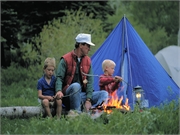Time Spent in Nature Boosts Kids' Well-Being

MONDAY, Aug. 31, 2020 (HealthDay News) -- Whether camping, hiking or gardening, connecting with nature has many benefits for children's well-being, a new study suggests.
"There is strong evidence that children are happier, healthier, function better, know more about the environment, and are more likely to take action to protect the natural world when they spend time in nature," said researcher Dr. Louise Chawla, professor emerita at the University of Colorado, Boulder.
Chawla reviewed previously published studies and found that children's connection with nature grew with time spent in natural environments.
Spending time this way also predicted how much the children cared for nature as adults, according to the study published online Aug. 5 in People and Nature.
Strategies that foster access to wild areas, parks, gardens, green neighborhoods and naturalized grounds at schools are important for children and teens, Chawla said in a news release from the British Ecological Society.
Connecting with nature, however, is not always positive. "My review shows that connecting with nature is a complex experience that can generate troubling emotions as well as happiness," Chawla said.
"We need to keep in mind that children are inheriting an unraveling biosphere, and many of them know it. Research shows that when adolescents react with despair, they are unlikely to take action to address challenges," she added.
But some strategies can help. These include teaching children what they can do to protect the natural world, as individuals and working in groups. It's also important to share examples of those who care for nature, she suggested.
Young people are more likely to think a better world is possible when friends, family and teachers listen to their fears and provide a safe space to share their feelings.
Surprisingly, Chawla found a disconnect between researchers who study children's involvement with nature and those who study environmental threats.
"People who study children's connection with nature and those who study their coping with environmental risk and loss have been pursuing separate directions without referencing or engaging with each other," Chawla said. "I am arguing that researchers on both sides need to be paying attention to each other's work and learning from each other."
More information
For more on kids and nature, visit the National Wildlife Federation.

The news stories provided in Health News and our Health-E News Newsletter are a service of the nationally syndicated HealthDay® news and information company. Stories refer to national trends and breaking health news, and are not necessarily indicative of or always supported by our facility and providers. This information is provided for informational and educational purposes only, and is not intended to be a substitute for medical advice, diagnosis, or treatment.

